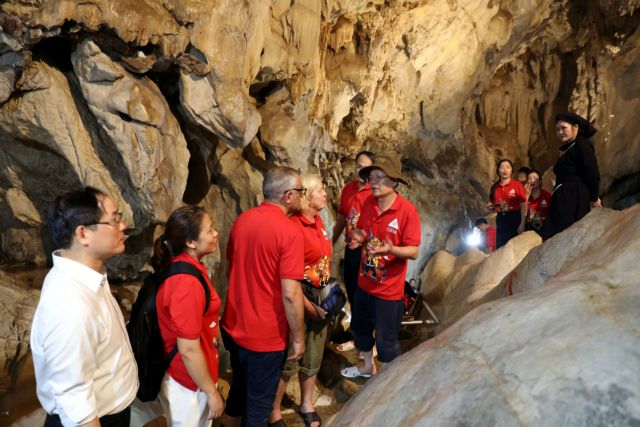 |
| A delegation of experts from UNESCO visit Keng Tao Cave in Chiến Thắng Commune, Bắc Sơn District, Lạng Sơn Province. VNA/VNS Văn Đạt |
LẠNG SƠN – A delegation of experts from UNESCO are in the northern province of Lạng Sơn, on a field trip to assess the possibilities of getting Lạng Sơn Geopark recognised globally.
The delegation is visiting 26 of the 38 attractions across four tourism routes of Lạng Sơn Geopark, which span the districts of Bắc Sơn, Bình Gia, Văn Quan, Hữu Lũng, Chi Lăng, Cao Lộc, Lộc Bình , and Lạng Sơn City.
Deputy Chairman of the provincial People's Committee Dương Xuân Huyên on Sunday stressed that the local area had identified and prioritised tourism as a spearhead of the local economy and Lạng Sơn recently invested in developing infrastructure for several potential tourist areas and destinations, including the Lạng Sơn Geopark.
Local authorities have also issued numerous policies and mechanisms and accelerated administrative reforms to create a favourable environment for attracting resources and investment for tourism development, he said.
The province is striving to develop the geopark to meet the criteria for recognition as a global geopark, thus conserving and promoting the comprehensive values of geological heritage, culture, history, archaeology and biodiversity, as well as outstanding scenic landscapes of the region, he added.
The official expressed his hope that UNESCO experts will provide recommendations to the province for maximising the potential of the Lạng Sơn Geopark for tourism development, contributing to creating new and sustainable livelihoods for the local community, and promoting socio-economic development of the locality and the northeastern region of Việt Nam.
Tuncer and Kristin, experts of the UNESCO Global Geopark Network, said that they are conducting on-site assessments to provide the most accurate evaluation, contributing to the better development of the geopark.
Covering 4,842 sq.km across eight district-level localities, Lạng Sơn Geopark is one of the largest of its kind in Việt Nam and boasts a number of unique values.
In terms of geology, geomorphology and landscape, it is home to a rich diversity of palaeobiological fossils dating back as far as 500 million years, many of which indicate this province used to be under the sea in the past. The park is endowed with many renowned landscapes such as the low mountain ranges surrounding valleys and villages in Yên Thịnh Commune of Hữu Lũng District and the caves like Thẩm Khuyên in Bình Gia District that accommodated prehistoric humans.
Regarding cultural values, it houses a number of temples dedicated to the gods in the worship of Mother Goddesses – an intangible cultural heritage of humanity, especially Bắc Lệ Temple, as well as villages of Tày and Nùng ethnic groups.
Local authorities are trying to improve public awareness of the park’s values as well as protecting and making use of its values for tourism development. VNS

